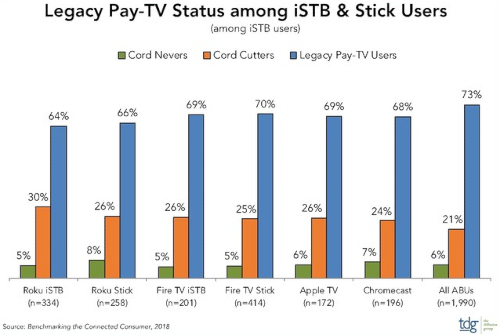Roku Users less likely to subscribe to legacy Pay-TV
Tuesday, October 23rd, 2018
Roku Users Less Likely than Other TV Streamers to Subscribe to Legacy Pay-TV
- Legacy Pay-TV Uptake Varies by Streaming Device Brand, Roku Users of Particular Significance
PLANO, TX — It is a fact that the use of dedicated streaming devices is correlated with lower uptake of traditional pay-TV services. However, new research from The Diffusion Group finds that one brand is particularly detrimental to legacy interests: Roku.

In its ninth iteration of Benchmarking the Connected Consumer, TDG found that 35% of Roku users do not subscribe to a legacy pay-TV service, notably greater than the 27% of adult broadband users in general, most of which enjoy streaming TV.
“Given its substantial footprint and brand strength, Roku devices are becoming a favorite of those living without legacy pay-TV,” notes Michael Greeson, TDG President. “The assortment of free and fee-based video apps in the Roku portal is undoubtedly a reason why we observe these correlations. For many TV streamers, buying a Roku, and getting access to the Roku video ecosystem, is no longer just an easy way to supplement their legacy pay-TV service, but a means of replacing it.”
By 2020, TDG forecasts that streaming sticks will near 45% penetration among US broadband households, with iSTBs close behind. “Should Roku remain the dominant brand, and continue to expand its vast OTT content ecosystem,” says Greeson, “legacy pay-TV will suffer.”
This new research is featured in TDG’s annual Benchmarking the Connected Consumer, which details the ownership, placement, connectivity, and use of media-centric consumer electronic devices in the broadband home.
Latest News
- Barb to start reporting TV-set viewing of YouTube channels
- SAT FILM selects multi-DRM from CryptoGuard
- Qvest and ARABSAT to launch OTT streaming platform
- ArabyAds & LG Ad Solutions partner with TVekstra in Turkey
- Freeview NZ satellite TV service to move to Koreasat 6
- Comscore expands YouTube CTV measurement internationally
